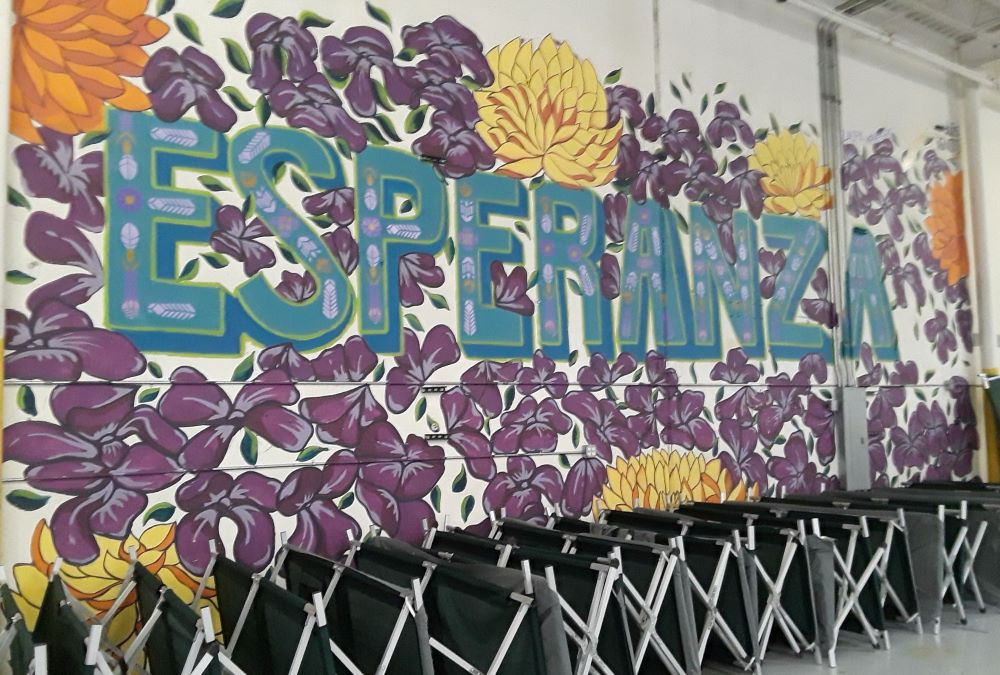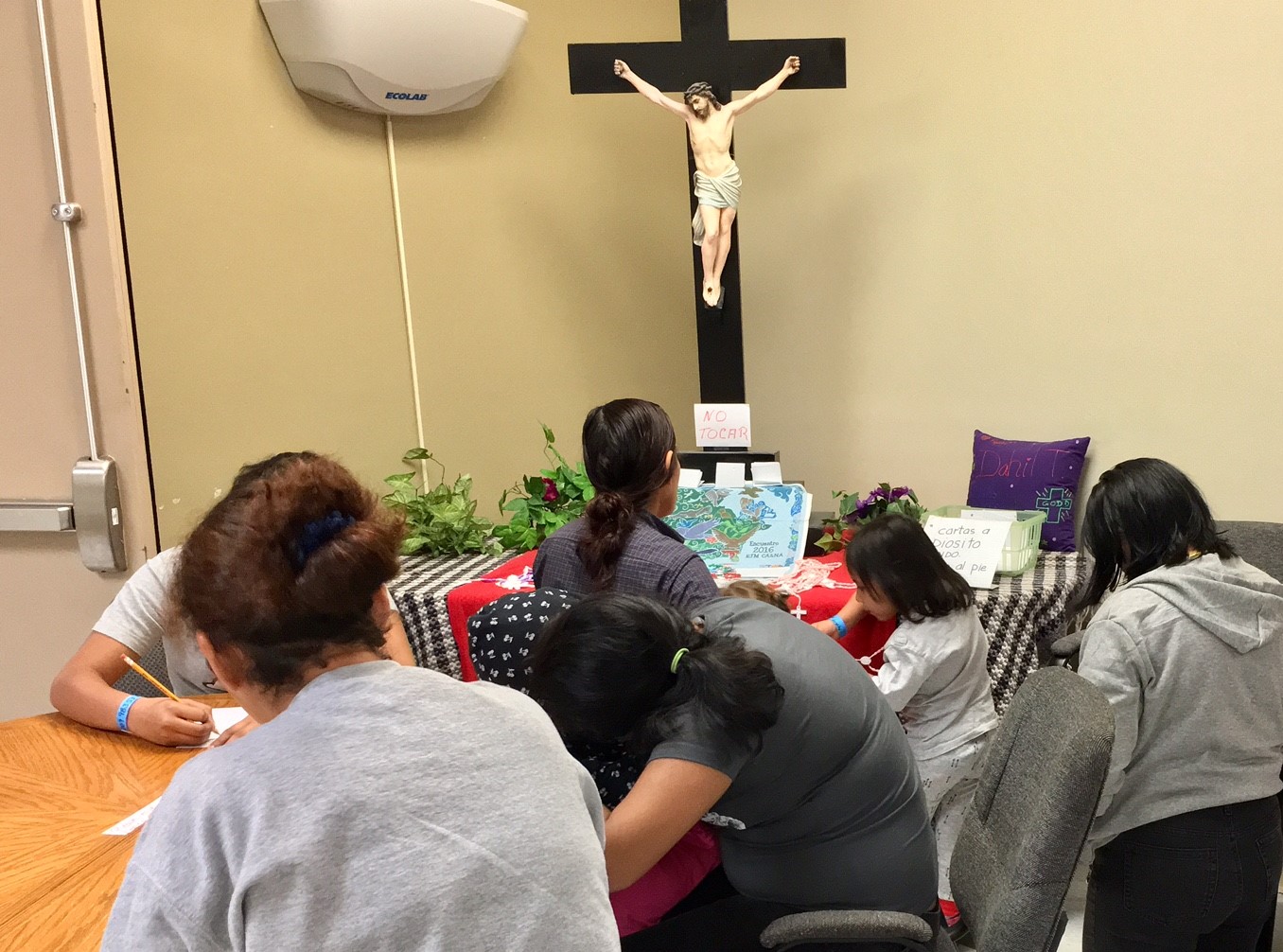
A mural at the Casa del Refugiado immigrant shelter in El Paso, Texas, reads "hope" in Spanish. (Courtesy of Pauline Hovey)
Ensconced in a small meeting room at Sacred Heart Church in El Paso, Texas, with the Jesuit priest who leads his order's ministry across 12 states, Puerto Rico and Belize, I wait patiently for his answer concerning his personal experience related to the theme of tonight's event: tracing the footprints of God through the spiritual accompaniment of migrants.
Fr. Tom Green, the head of the Jesuits' U.S. Central and Southern province, has come to Sacred Heart as his last stop on a yearlong Ignatian pilgrimage to visit parishes across his territory. Together with pastor Jesuit Fr. Rafael Garcia and El Paso Bishop Mark Seitz, they chose to focus during an evening Mass and gathering on May 14 on the rich possibilities for spiritual accompaniment of the migrant poor.
I've come tonight because, as a volunteer at local hospitality houses, I want to hear about the spiritually rich experiences of others. And be reminded of my own.
Greene is clearly humbled as he considers the impact of his past work as an attorney handling asylum cases in Chicago, practicing immigration law with unaccompanied minors and offering legal counseling at detention centers. He should be able to easily speak on this topic. But his is a common response. Whenever I've questioned anyone who's accompanied migrants and asylum seekers about the impact, they turn pensive, sometimes emotional, as they consider their experiences and attempt to find words.

A group of immigrants pray at the Casa del Refugiado immigrant shelter in El Paso, Texas. (Courtesy of Pauline Hovey)
"It was deeply spiritual and evangelical work," he finally says, "but I have to say that I was the one being evangelized much of the time."
Steeped in the Ignatian spirituality of finding God in all things, Greene acknowledges that migrant youth taught him what it means to profess one's faith by how they saw God in their perilous and uncertain journeys. Their immense faith and hope made him question how he could not have hope in his own life, no matter the circumstances.
"The ultimate goal in the Christian life is to see the world from the eyes of Christ, and to have his response," Greene said. "So, to see these people beaten, abandoned, raped, extorted, called criminals, how could you not try and help them?"
Yet Greene says that he was drawn to this ministry because it has helped him so much in his faith. "I was trying to be Christ for them and yet they were Christ for me," he says, acknowledging that may sound selfish.
I smile in recognition. I've heard this so many times, from so many volunteers, I know it's not a glib comment. From migrant shelters, one of which is on diocesan property, to courtrooms, from the El Paso airport to the detention center, local volunteers have walked alongside and understood firsthand how Christ is present in the face of the migrant and refugee. And, in my personal journey, no one has taught me more about what it means to live the Gospel.
Even Seitz, with years of praying and studying Scripture, says he accompanies migrants because he learns so much from them. "There's an amazing faith to these people who have no other place they can put their hope," he told me. "And when they do put their trust in God, amazing things happen, and they can see that God is their source in answer to their prayers."
A controversial figure among some for his outspoken support of immigration reform and caring for migrants, Seitz's personal experiences of walking alongside the people inform his commitment. He shares that he's become such a strong advocate for immigrants because "the more you get to know them as human beings, the closer you feel, the more you share their pain, and then are moved to speak strongly without fear."
A really good start, he says, is to recognize them as fellow human beings. "Then you can go a step further and recognize them as guides on your journey," he said.
If accompanying migrants has so greatly affected these two clerics who devote their lives to God, imagine how they impact lay volunteers like myself.
My friend Janet Kincaid comes to mind. When Kincaid began accompanying migrants in summer 2014, she was experiencing what she'd call somewhat of a crisis of faith. By listening and allowing those she accompanied to share their suffering with her, she learned the sacredness of being present to another, and went from doubting God to having her most powerful experiences of God in others.
As she considers the hundreds, possibly thousands, she's accompanied since then, Kincaid is heartened by their strength and faith. "I don't think I've met a single one who didn't want to be a great contributor to our country," she says. "They would only boost our economy."
Debbie Northern, a Maryknoll lay missioner who's been serving in El Paso since August 2021, previously lived in El Salvador, where she came to know the circumstances that push people to leave their homes. Accompanying them on this side of the border has made her more grateful and aware of the gifts and privileges she's received. She tells me that simply being born in the U.S. is one of those unmerited gifts.
It's a gift I've come to appreciate more as well.
Advertisement
But I realize that some will undoubtedly argue, as one participant does later that evening, that this gift shouldn't be squandered by opening our borders. Seitz challenges the use of the term, noting this is not about "open borders"; it's about addressing antiquated laws and creating policies that address the situation today. He cites the tremendous shortage of laborers in the U.S., how the migrants he knows are working their hearts out, and how unfortunate it is to have these kinds of negative images associated with immigrants.
It seems fitting that this evening's Gospel reading is from John 13, the one in which Jesus gives his disciples a new commandment: "love one another. As I have loved you, so you also should love one another."
In his homily, Seitz stresses, "We don't have exceptions written in. The way Jesus challenges us to love is as he loved us."
But he also knows that to love like this is impossible without the grace of God. A human being isn't capable of loving others like this on their own. It is the simplest and the hardest of Jesus' teachings. And the best teachers I and my fellow volunteers have had on this journey are the migrants at our border.








